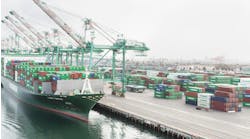Electronics Distributors Busy Despite Uncertain Economic Outlook
The waiting game that has characterized the global economy over the last few years was showing no sign of change as the summer came to a close, adding to the woes of consumers and business leaders alike. But some of the industry’s largest distributors say they’re busy despite the uncertain economic climate and that they remain focused on executing plans to grow online and geographically.
“We’ve been in hand-sitting mode for three years now. Sooner or later we have to shake this off,” says Michael Knight, senior vice president for the Americas at TTI Inc., pointing to the cautious outlook that remains the prevailing sentiment among many business leaders today. “But the general trend is that everyone is busy—chasing new customers, introducing new products. I’ve never seen it busier.”
The story is similar at TTI’s sister company, Mouser Electronics, where top executives say the distributor is shipping more lines and filling more orders than ever, pointing to record growth in the first quarter followed by an increase in the second quarter. The outlook is for 10% growth in 2012, senior vice president of business operations Peter Shopp said during a mid-July interview. Though Mouser is maintaining a high volume of orders, the dollars per order are down—a reflection of the slow economic recovery and ongoing uncertain climate. Still, the situation bodes well for when the economy picks up, says vice president of technical marketing Kevin Hess.
“We’re adding 600 new customers per day globally,” says Hess. “That 600 number keeps growing, and 40% of it is from Asia and Europe. We expect to keep growing there, as well.”
Keeping up with customer demand for new products, online offerings, and supply chain services is at the top of distributors’ to-do lists as they continue to look for solid signs of an impending recovery.
In Search Of New Customers
The Internet is driving much of Mouser’s new customer growth, accounting for 75% of new accounts and close to 50% of sales. The distributor has 54 country-specific Web sites that offer local languages, currency transactions, and technical assistance. Mouser added 10 new country-specific sites between May and July alone, mostly in Central and South America.
New online services this year include an intelligent bill of materials (BOM) management system (launched in February), a low-price fixed-shipping option designed to benefit customers who want products shipped to residential addresses, and ongoing efforts to increase the speed of each country-specific site. The ultimate goal is to build a wide portfolio of products and services that offer the most value to design engineers. Company leaders say this focus plays to their advantage in good and bad economic times. Even in tough times, engineers are still coming up with new designs—a testament to today’s fast-paced technology culture and its accompanying demand for electronic components and systems.
“People are always working on something new,” explains Hess. “So our focus on new product development really helps.”
By mid-July, Mouser had added nearly 20 new suppliers to its line card and was maintaining a steady flow of new product introductions worldwide. As a result, marketing is playing an increasingly important role, and the company is stepping up efforts to reach more customers through local marketing efforts. As part of its recent expansion into Asia, for example, Mouser installed a local marketing team to build business throughout the region. The company’s Texas-based executive team traveled to Asia in August to meet with the new team and work on growth strategies for the region, a chief goal being to “localize” the Mouser message.
“We can’t do it all from here,” says Hess, pointing to the company’s headquarters in Mansfield, Texas.
Earlier this year, Mouser enhanced its local presence by adding online currency transactions in the Chinese Renminbi (RMB) and accepting China UnionPay (CUP), the country’s government inter-bank transfer network and bank card organization. The actions represent a step toward more seamless transactions and streamlined logistics throughout Asia, company leaders say. Now, the challenge is getting the word out locally about these and other offerings.
“We want the message to be from our Chinese market to our Chinese market,” says Hayne Shumate, vice president of Internet business.
Mouser maintains the same philosophy in other regions, particularly Europe, where the company has seen considerable growth over the last two years. Heavy investments have included new offices and staff in Germany, the Czech Republic, the Netherlands, Spain, and Sweden along with expanded operations in France, Italy, and the United Kingdom. The company also expanded its operations in Israel. The efforts brought Mouser 20% growth in Europe in the first half of this year, on top of 40% growth last year.
Keeping Busy With Services
Multi-channeldistributor Allied Electronics is feeling the online crunch as well, and vice presidentof product management and marketing Scott McLendon says e-commerce is at the heart of the company’s business today. Even if customers are just using the Internet to gather information, the Web still drives much of the business, he says.
Together, Allied and its sister company, U.K.-based RS Components, derive more than 50% of their business via the Web, and the goal is to increase that substantially over the next several years. Allied’s and RS’s parent company, U.K.-based Electrocomponents plc, has said it wants to conduct 75% of business transactions online globally in the next five years. A large part of that effort will include the addition of tools and services that make it easier for customers do business online.
“We want to deploy more online tools—design tools, for instance—that are useful to engineers,” says McLendon. “It’s not inconceivable to see our (online) business approach that of a typical B2C operation.”
Despite the push to do more online, McLendon points to customers’ growing need for supply chain services as another way distributors are keeping busy in today’s challenging environment. He says distributors are increasingly being asked to perform more back-end business functions for customers, such as harvesting and entering orders placed through various ERPsystems and managing and maintaining compliance-related data. In many ways, he says distributors’ traditional focus on value-added services centered solely on products—offering product kits and cut reels, for instance—is shifting to one focused on managing information inthe supply chain.
“There’s a real focus on providing services that don’t have anything to do with the product,” McLendon explains. “In some cases, we’re basically taking on the customer’s entire supply chainfunction.”
Such services used to be reserved for large customers and government contracts, but McLendon says more and more small and mid-sized customers are seeking the same kinds of services. The net result is a shifting of work to the distributor and a subsequent rise in the cost of doing business. To maintain margins, distributors are challenged to shift costs within their own businesses.
“We have to be very adaptive to all of our customers and their different requirements,” McLendon says. “At the end of the day, we all still need to accomplishlargely the same things. It’s just that the work is being shifted [throughout the supply chain].”








